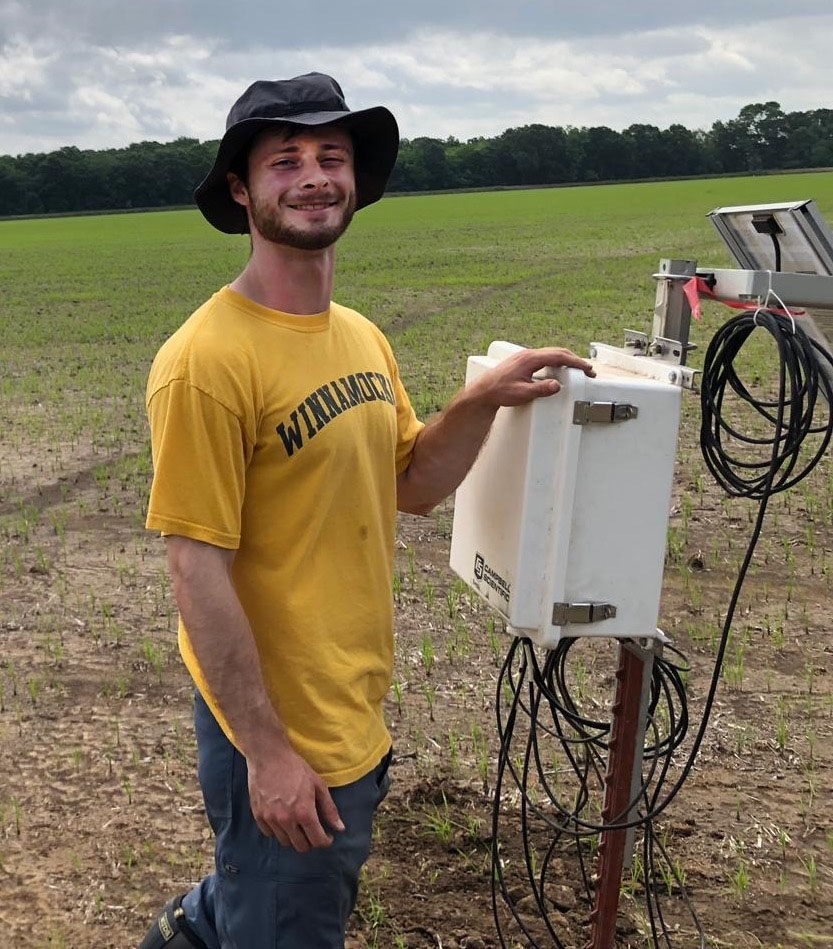
An honors thesis demonstrating farmers can significantly reduce water use while maintaining crop yields has earned a biological engineering senior a spot in a peer-reviewed journal.
The thesis was written by Sam Carroll, an Honors College Fellow who graduated in May. He was advised by Kieu Le, a teaching assistant professor of biological and agricultural engineering. The work appeared in the journal Sustainability in a special issue titled "Rethinking Agriculture to Meet Food, Fiber and Energy Demands."
Carroll is first author on the article, "Simulating Soybean-Rice Rotation and Irrigation Strategies in Arkansas, USA Using APEX." Le is corresponding author on the paper, which also includes authors Benjamin Runkle, associate professor of biological engineering, and postdoctoral researcher Beatriz Moreno-Garcia.
Carroll's work sought to validate an advanced crop model for Arkansas's unique agricultural setting and use it to demonstrate that farmers can reduce their water use by as much as approximately 20 percent without impacting their harvest yields. These modeled outcomes can guide future tests in experimental farm trials prior to becoming a formal recommendation to Arkansas farmers.
The research studied irrigation and crop rotation practices to help farmers save water while maintaining yields for rice and soybean. Arkansas accounts for 49 percent of the rice production area in the U.S., and is the 10th-largest producer of soybean in the country. Carroll's study modeled crop rotation.
Carroll said he chose the topic because of its impact.
"I chose this type of research because of its importance," he said. "Global population growth makes the need for resource efficiency in agriculture increasingly critical. Crop models like the one we used can be useful tools for making improvements in this area. I hope this research will help farmers be as economical as possible in their use of resources. If they can produce the same amount of rice with less water, they will save money as well."
Le said the work was the first of its kind in Arkansas.
"No study has been done in Arkansas to evaluate rice yield changes under crop rotation of soybean-rice in Arkansas, as well as reduced irrigation amount under the different irrigation methods in rice — multiple inlet rice irrigation, conventional flooding, alternate wetting and drying, and furrow irrigation for rice."
Le also praised Carroll's dedication to the project.
"He officially started his honor thesis with me during spring 2020, but had been using the Agricultural Policy/Environmental eXtender (APEX) model since September 2019," she said. "There are so many details in the model and processing the data that it takes time to learn to use the model before actually having the inputs from the fields. After his graduation in May, he has been continuously working with us to get the paper done, process the data analysis, run statistics, and have the paper completed."
Runkle said it's uncommon for undergraduate work to appear in peer-reviewed publications.
"It is rare — maybe less than 10% achieve this feat — in part because it often requires significant iteration of the work with different co-authors and contributors, and in response to the comments and feedback received during the honors thesis presentation," he said. "It also can require dedication in the summer following graduation, when many students have moved on to other activities."
The publication highlights how strong Sam's work was to survive the peer review process. We had several reviewers with different perspectives but they all agreed that the work should be published after their suggestions. Sam was patient and thorough in helping us all work through the revision process, and that dedication is really evident in the final product."
Topics
Contacts
Nick DeMoss, director of communications
College of Engineering
479-575-5697, ndemoss@uark.edu